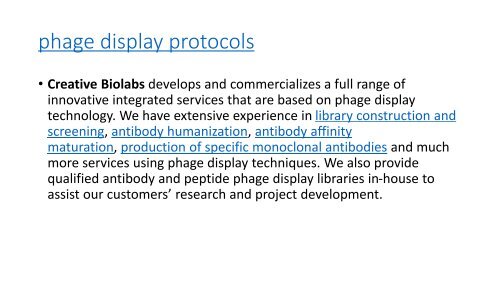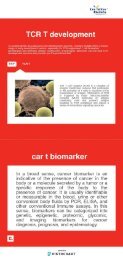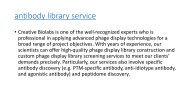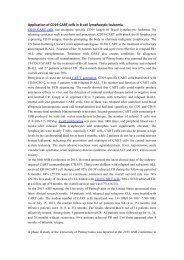phage display protocols
Create successful ePaper yourself
Turn your PDF publications into a flip-book with our unique Google optimized e-Paper software.
<strong>phage</strong> <strong>display</strong> <strong>protocols</strong><br />
• Creative Biolabs develops and commercializes a full range of<br />
innovative integrated services that are based on <strong>phage</strong> <strong>display</strong><br />
technology. We have extensive experience in library construction and<br />
screening, antibody humanization, antibody affinity<br />
maturation, production of specific monoclonal antibodies and much<br />
more services using <strong>phage</strong> <strong>display</strong> techniques. We also provide<br />
qualified antibody and peptide <strong>phage</strong> <strong>display</strong> libraries in-house to<br />
assist our customers’ research and project development.
• Phage <strong>display</strong> is a kind of long-lasting laboratory platform for the<br />
large-scale study of molecules interaction, such as protein-protein,<br />
protein-peptide and protein-DNA interactions, and select molecules<br />
with the highest affinity for specific targets. The technology was firstly<br />
described by Smith (1985), and then be further expanded by such<br />
groups of pioneers, e.g. Greg Winter and John McCafferty (Laboratory<br />
of Molecular Biology), Richard Lerner and Carlos Barbas (Scripps<br />
Research Institute), and Frank Breitling and Stefan Dübel (German<br />
Cancer Research Center).
• The <strong>phage</strong> <strong>display</strong> technique relies on engineering bacterio<strong>phage</strong>s to<br />
<strong>display</strong> interested molecules (e.g. proteins and peptides) on their<br />
surface. To achieve this, the gene encoding the interested molecule is<br />
inserted into the gene of <strong>phage</strong> coat protein, which resulting in the<br />
expression of interested molecule fused with the coated protein of<br />
bacterio<strong>phage</strong> particles and a linkage between genotype and<br />
phenotype. The <strong>phage</strong> <strong>display</strong> library is then built up by assembling<br />
millions of genetically modified <strong>phage</strong>s, which can be used for further<br />
screening and selection. This platform can contribute to mimic<br />
natural molecules within the cellular process and detect their<br />
interaction with other molecules.
• With years of research and development, Creative Biolabs has<br />
extensive experience in <strong>phage</strong> <strong>display</strong> platform by employing various<br />
types of <strong>phage</strong> in various project objectives. In general, filamentous<br />
bacterio<strong>phage</strong>s (e.g. M13) are the most popular vehicle choice for<br />
<strong>phage</strong> <strong>display</strong> and extensively used in many types of research.<br />
Meanwhile, Creative Biolabs is also an expert to provide <strong>phage</strong><br />
<strong>display</strong> related services via either T4 or T7 <strong>phage</strong> systems, which can<br />
provide different promising alternatives by their special merits.
• Phage <strong>display</strong> has been well-recognized as a pivotal tool in immunological and<br />
cellular biological research due to its remarkable contribution to the<br />
development of new drugs and vaccines. This technology has been widely used as<br />
<strong>phage</strong> <strong>display</strong> library to select or isolate proteins, scaffolds, peptides or<br />
antibodies with high affinity and specificity for interested targets.<br />
• As one of the most successful applications, <strong>phage</strong> <strong>display</strong> technology has proved<br />
its safety and efficiency in the research and development of specific antibodies.<br />
Notably, take advantage of <strong>phage</strong> <strong>display</strong> platform based on human antibody<br />
sequences makes it available to produce fully human antibodies without the<br />
ethical and moral issues. In addition, this platform is also a wide choice for in<br />
vitro protein evolution; a typical example is the well-known antibody affinity<br />
maturation. Combine with mutagenesis and <strong>phage</strong> <strong>display</strong> technologies, <strong>phage</strong><br />
<strong>display</strong> antibody library with the size of over 10 8 (10 16 has ever been achieved<br />
by Creative Biolabs) can be generated to screen the specific antibodies with high<br />
affinity for the development of high efficacy with low side effects antibody drugs.

















